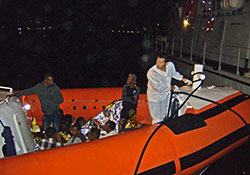Improving and coordinating the public health response to migration

WHO
Since 2011, WHO/Europe has worked to strengthen the capacity of countries’ public health services to deal with large influxes of migrants, and ensure a coordinated response. It has made several assessments of health needs, and countries have welcomed WHO’s support. Nevertheless, greater effort is needed to address the endless tragedies related to migration.
WHO/Europe, through its European Office for Investment for Health and Development, in Venice, Italy, manages the Public Health Aspects of Migration in Europe Project. Following a recent tragedy – the sinking of a ship carrying migrants to Italy off the Sicilian island of Lampedusa, resulting in the loss of hundreds of lives – WHO staff continued to work closely with the Councillor of Health of Sicily Region to assist the Italian health authorities.
Public Health Aspects of Migration in Europe Project
The Project works within the new European health policy framework, Health 2020, taking a social-determinants perspective to improve migrants’ health. It supports policy-makers, health planners, local health professionals and others who are responsible for providing high-quality health care to migrants. The objective is to fill potential gaps in the delivery of health services (including those for prevention, diagnosis, monitoring and management of diseases) and to provide policy recommendations.
Following expert consultations, WHO developed a toolkit for assessing local health systems’ capacity to manage migration in a crisis. Italy will be the first country to be assessed, and WHO will make other assessments, in partnership with ministries of health, in Malta, Portugal and other Mediterranean countries. The goal is to identify the gaps that health sectors need to fill to establish national contingency plans.
Making migration a healthier process is essential for both migrants and the citizens of recipient countries. WHO is committed to supporting equitable access to health services for migrants, establishing coordination mechanisms for coping with large influxes, and developing and enhance migrant-, culture- and gender-sensitive health policies and services.



